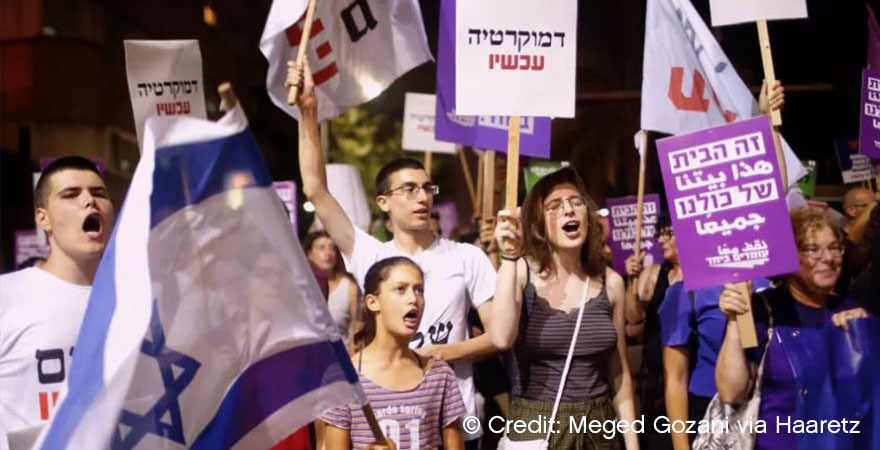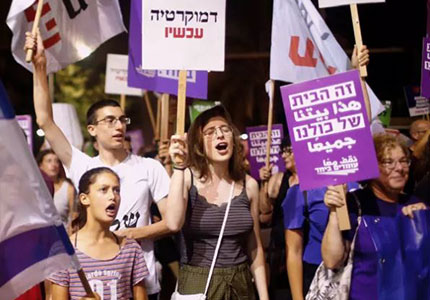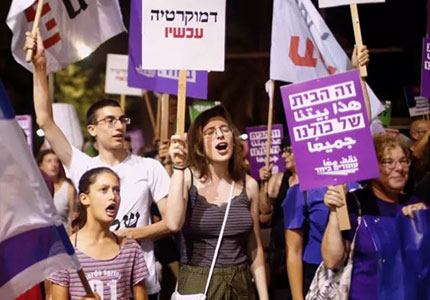
One Young World Ambassadors have reacted with dismay to Israel’s highly-controversial new nation state law, which has been widely condemned for promoting segregated communities.
Ambassadors in the region immediately criticised the law, saying it “kills any chance for a just future between the Israelis and the Palestinians” and sends “a message that non-Jewish citizens in Israel are not welcomed”.
The nation state legislation, approved last week by the Knesset, Israel’s parliament, decrees: “The state sees developing Jewish communities a national value and will act to encourage, promote and establish them.”
Israeli One Young World Ambassador Noam Shuster, a peace activist in Israel, says the law “ignores the Palestinians, delegitimises the Arabic language from this land and kills any chance for a just future between the Israelis and the Palestinians”.
Noam works as an activist and actress and uses comedy to speak to audiences and influence people.
She discussed her work and her dream of a more inclusive and harmonious society in Israel in a speech to One Young World’s 2014 Summit in Dublin. Noam is of mixed Romanian and Iranian heritage and grew up speaking Hebrew, Arabic and Farsi in one of Israel’s few mixed communities. “When I speak Arabic most people think I’m from the military or the intelligence, or they think I’m Palestinian because I look Middle Eastern,” she told delegates.
This week she stressed that “giving up is not an option”, in spite of the new law. “If the Palestinians are not safe and free on this land, we will never be free - our fates are intertwined,” she said. “I am a Jewish woman with family roots in Iran. I speak Arabic not to spy on my neighbours but for this crazy purpose called life - for communication and establishing relationships.”
Noam said that ordinary people should not allow politicians to build barriers between communities. “We cannot wait for our leaders. We will teach each other the language of hope,” she said.
The new law is “very dangerous”, said Palestinian One Young World Ambassador George Zeidan. “It disrupts the balance between Israel’s Jewish character and its democratic character, which is by the way just a big falsehood.”
The legislation sends out a dual message, he said. “First it is a message that non-Jewish citizens in Israel are not welcomed. By removing Arabic as an official language for the country, it basically states that Israel is a state for Jews and only Jews. It also sends a message that non-Jews will not be treated equally and will always be second. In a country that is already filled up with lots of discrimination, injustice and inequality, this law just legalized this inequality.”
George, who was born and raised in the old city of Jerusalem, is a founder of the Right to Movement Marathon in Palestine, which aims to promote movement in Palestine and uses sport to encourage people to exercise their own will and human rights. “We continue to see basic rights like freedom of speech and equality being eroded,” he said, in light of the new legislation. “This is a wider slide from democracy. It is [part of] a wider trend around the world to embrace populist policies.”
The new law has been criticised in the international media for not only supporting the growth of purely Jewish settlements but of extending such segregation to Israeli cities. Writing in Israeli newspaper Haaretz, commentator Mordechai Kremnitzer said the law raises “overt, blunt discrimination to the constitutional level”.
“As a Palestinian who has suffered my entire life, and is still suffering, under the Occupation of Palestinian land, the killing of Palestinian people and the displacement of Palestinians from their land, I am not surprised by the recently passed racist nation law in Israel,” adds One Young World Ambassador Abeer Abu Ghaith, who is the first high-tech female entrepreneur in the West Bank. “[We should] call for international mobilization and solidarity to force Israel to apply international law guaranteeing the right of return, freedom, and equality. This is exactly the opposite of racist national law!”
At the One Young World Summit 2017 in Bogotá, Colombia, Israeli delegate speaker Rotem Weizman talked of the importance of Middle Eastern communities of different religious and ethnic backgrounds working together to manage their natural resources and to build greater harmony.
The One Young World Ambassador, who works for EcoPeace Middle East on the Good Water Neighbours project, asked Summit delegates: “What if, instead of fighting over our holy land and water with our Jordanian and Palestinian neighbours, we will fight for our waters with our neighbours?”


